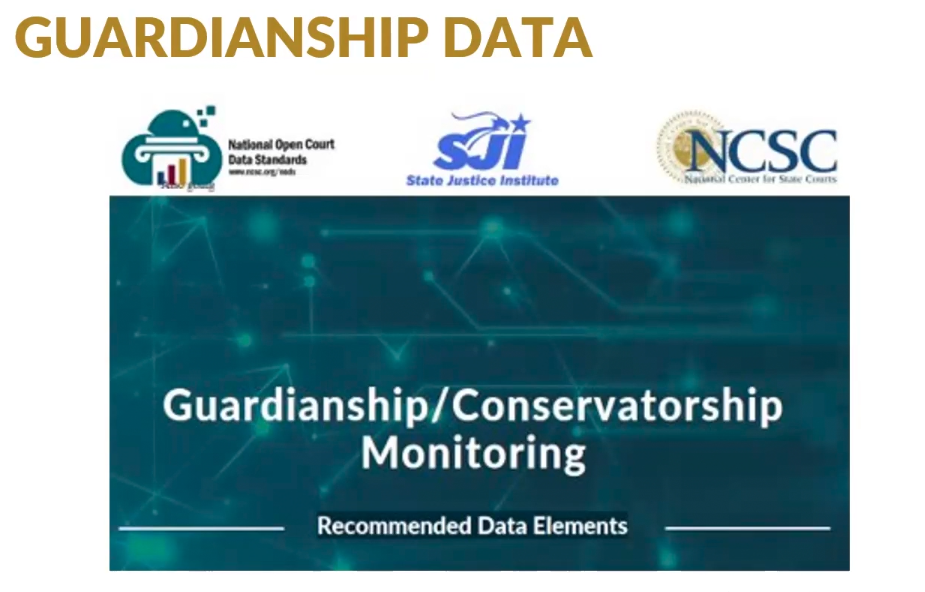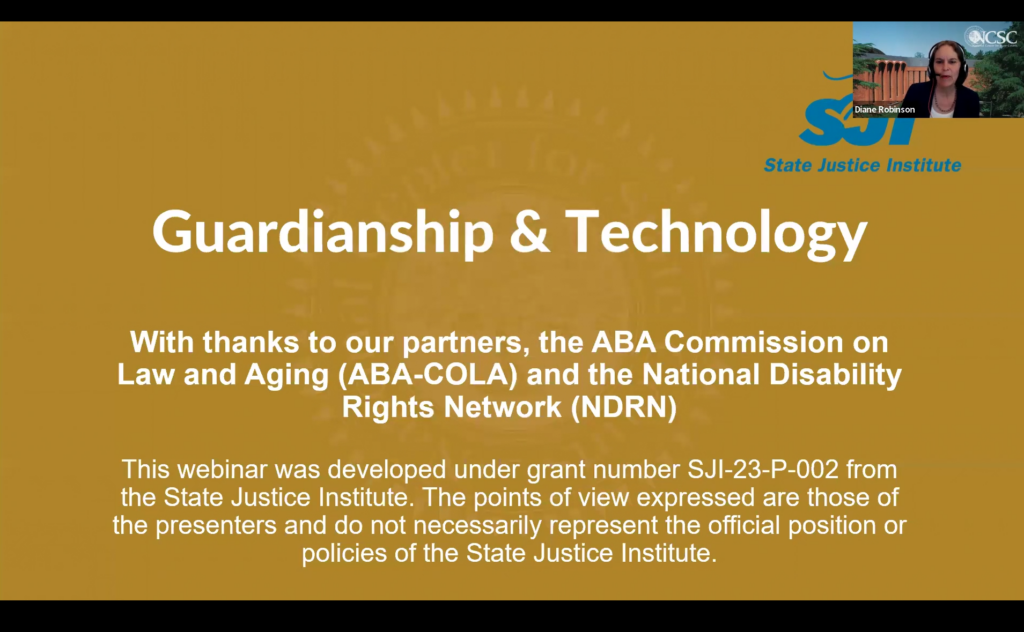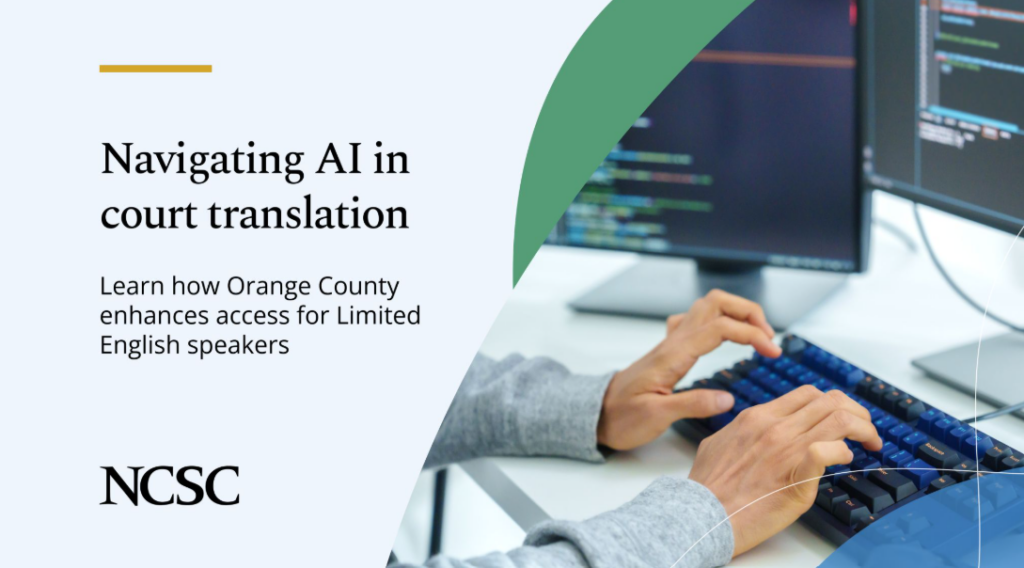Funded by the State Justice Institute, the National Center for State Courts, in partnership with Rulo Strategies LLC, launched the Rural Justice Collaborative (RJC) to showcase the strengths of rural communities and highlight the cross-sector collaboration that is a hallmark of rural justice systems. These strengths include strong professional networks, deep ties to the communities they serve, resiliency, and ingenuity. The Rural Justice Collaborative is guided by an advisory council of rural practitioners representing the judiciary, public safety, behavioral health, public health, child welfare, victim services and other stakeholder-focused justice systems. The advisory council guides the initiative and has focused initial efforts on advancing innovation, promoting collaboration, and raising awareness of rural justice system needs.
Author: Lauren Curtis
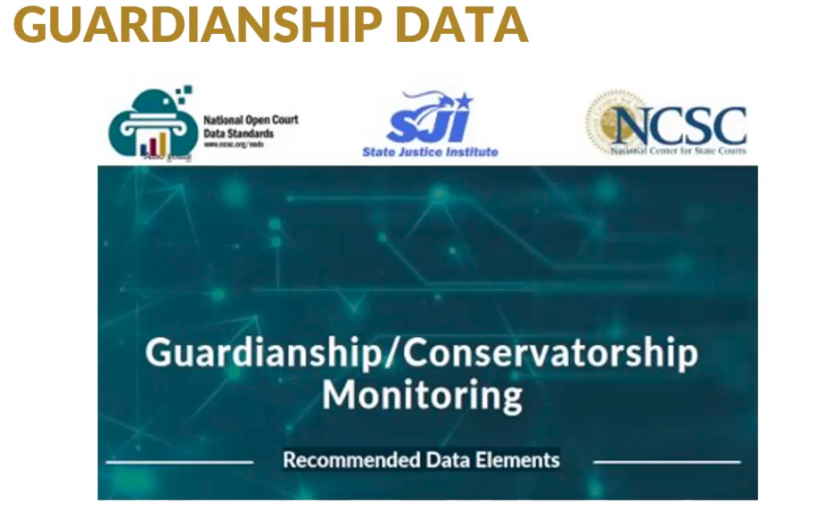
Guardianship & Technology
The National Center for State Courts, in cooperation with the ABA Commission on Law and Aging (COLA) and the National Disability Rights Network (NDRN) created technology and data standards for court case management systems for guardianship and conservatorship cases. Most case management systems are designed to track cases from filing to disposition. However, courts are required to monitor guardianship and conservatorship cases for as long as the guardianship or conservatorship is in place.
NCSC, ABA-COLA, and NDRN brought together a group of subject matter experts from around the country to discuss what courts need to effectively monitor the well-being and financial assets of those subject to guardianship or conservatorship. These experts included guardians, subject matter experts from state administrative offices of the courts, representatives from local courts, CMS vendors, and attorneys. The group used reviews of existing CMS systems, surveys, and focus groups to develop detailed user stories to describe the needs of judicial officers, court staff, guardians and conservators, and those subject to guardianship and conservatorship. These user stories were the basis for new standards.
The standards were approved by the National Association of Court Management (NACM), the Conference of State Court Administrators (COSCA) and the Joint Technology Committee (JTC) and are now official court technology standards. They, along with supplemental materials, can be viewed here.
The new standards were shared at the 2024 eCourts conference and in two webinars, found here: Maximizing Your CMS for Effective Guardianship Oversight and Innovative Guardianship Improvements – Enhancing Electronic Systems to Better Support Court Monitoring.
For more information on monitoring guardianships and conservatorships, please visit here.
Upcoming Webinar! Family-Centered Fridays: Right Services, Right Time
Join in for the introduction of Right Services, Right Time – an initiative that offers family courts practical tools and targeted support to handle even the most complex cases.
![]() Date: Friday, July 18th, 2025
Date: Friday, July 18th, 2025
![]() Time: 12:00PM EST
Time: 12:00PM EST
![]() Register Here: Family-Centered Fridays: Right Services, Right Time – Promising practices for family courts | National Center for State Courts
Register Here: Family-Centered Fridays: Right Services, Right Time – Promising practices for family courts | National Center for State Courts
![]() Open to court professionals, justice partners, and anyone working to improve access to justice.
Open to court professionals, justice partners, and anyone working to improve access to justice.

State Courts Response to Opioids and the Impact on Children
What if families facing a crisis could receive support before entering the court system? In 2019, the National Center for State Courts received funding to identify promising practices in state and local courts that aim to prevent removal through non-adversarial collaborative team approaches and timely access to treatment and services. The Family Preservation Initiative (FPI) in Rutherford County, Tennessee was one of the standout programs identified.
FPI transforms how communities support families by intervening before circumstances escalate to court involvement. When families experience challenges likely to result in a juvenile court petition, FPI staff step in to build relationships, learn about each family’s unique strengths and needs, and connect them to resources and services. This individualized approach keeps children safely with their families while providing the entire family with the support needed to overcome obstacles.
Referrals come from law enforcement, schools, community organizations, and families themselves. Families involved in FPI are not under court supervision; however, the court’s backbone support for the program helps build and sustain community partnerships essential for its success. By intervening early, FPI prevents family separation, minimizes trauma, and provides crucial support when families need it most. The documentary, “Together We Thrive: Championing Prevention Efforts with Tennessee’s Family Preservation Initiative,” offers a powerful look at FPI through the eyes of the families and professionals involved in the program. Their stories demonstrate how family-centered and prevention-focused approaches can create positive changes for children, families, and communities.
“What we really hope is that this would become the new norm, that this wouldn’t be just a pilot or a program or in a few places dotted around the county. But this would become the way that people want to intervene much sooner so that children never become part of the system.”
-Deborah Taylor Tate, Former Director, Tennessee Administrative Office of Courts
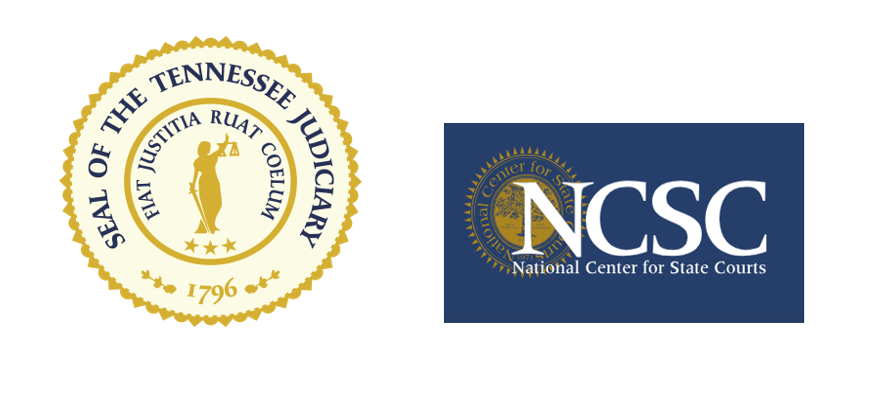
AI Software Gives Boost to Diversion Programs
Last year, the Conference of Chief Justices and the Conference of State Court Administrators adopted a resolution urging NCSC to showcase effective, scalable models for civil diversion programs that create alternate pathways for litigants to resolve disputes. These programs would be grounded in a set of guiding principles, which encourage collaboration with other civil justice system partners.
Inspired by that resolution, NCSC formed a partnership with the American Arbitration Association (AAA) and the Court of Common Pleas in Lancaster County, Pennsylvania, which had an existing consumer debt diversion program.
A review of filings from the first half of 2024 showed that the court’s diversion program reduced the number of cases on the docket by more than half. Those results suggested that this market was ready for testing software developed by AAA. The software is designed to help further expand a burgeoning diversion program the court had established to address credit card debt cases.
“NCSC has been extremely supportive of the Lancaster County Court’s vital Credit Card Diversion Program,” said Shelley Schenk, diversion program coordinator and staff attorney of the Lancaster County Court of Commons Pleas. “The AI App developed by AAA will save the court a great deal of time and resources.”
The purpose of the software—coined the Court Diversion Eligibility Screener—Built by AAA—is to help increase access to justice, preserve judicial resources, and streamline civil caseload management. The screener applies AI to help court staff evaluate and triage cases while also automating the administration and management of those that are routed for diversion.
Software such as this will be most impactful in jurisdictions where court-based civil diversion programs are already in place (or are ready to be launched) and sound case flow management practices exist and are ready for automation. With staff support and oversight, successful diversion programs can be optimized to divert cases more efficiently while reducing the burden on court staff and improving the litigant experience. AAA and NCSC are now partnering to make the eligibility screener software available for use by other courts. Read more about the partnership in this article on NCSC’s website, and contact the Access to Justice team to learn more.
Creating a More Accessible Court Experience for All
A new resource is now available to support courts in upholding state and federal law and applying Title II of the Americans with Disabilities Act (ADA), which applies to all state and local government entities, including courts.
Serving People with Disabilities and Title II of the ADA: A Toolkit for Courts helps courts address aspects of the law that apply to court services, covering areas from physical access to digital accessibility.
“Making courts accessible for people with disabilities improves the system for all users,” said Grace Spulak, an NCSC principal court management consultant and lead author of the toolkit. “Thinking about the needs of court users with disabilities leads to process simplification, clearer communication, and better navigation for everyone. It’s a win-win!”
Courts can serve people with disabilities by developing accessible resources, services, buildings, or documents, and by creating accommodations or modifications to existing ones to meet individual needs.
The toolkit details essential aspects of serving people with disabilities, including:
- Establishing relationships with the disability community
- Ensuring effective communication
- Addressing document and web accessibility
- Considering building and facility accessibility
- Understanding the use of service animals
- Addressing the use of mobility devices
For more information on access to justice and to access the toolkit and other accessibility resources, visit: ncsc.org/accessibility.
Navigating AI in Court Translation
Navigating AI in court translation is opening new doors for access to justice.
To meet the needs of Limited English Proficient (LEP) users, the Superior Court in Orange County, Calif., is leveraging an AI-powered Court Application for Translation (CAT) tool.
Blanca Escobedo, deputy chief operations officer for Orange County Superior Court, shared an overview of the tool last month during the “AI-assisted translation in the courts: Exploring opportunities and navigating risks” webinar, presented by the TRI/NCSC AI Consortium.
Orange County’s experience with machine translation
California’s CAT initiative began with the top two languages needed in Orange County: Spanish and Vietnamese. The court customized a third-party product to understand legal terminology to improve translation accuracy and hired certified translators and interpreters for quality control. By combining machine translation with certified human review, they’ve improved accuracy, cut costs, and sped up case processing. Learn how AI and human expertise together can transform court services: Navigating AI in court translation: Insights for court leaders | National Center for State Courts
#AccessToJustice #CourtInnovation #AIinJustice #LegalTech #AI
Upcoming Webinar! Exploring the Effects of AI & Generational Shifts in the Workforce: June 18th, 2025, at 1:00PM EST.
Exploring the Effects of AI & Generational Shifts in the Workforce: June 18th, 2025, at 1:00PM EST.
As state courts confront the dual challenges of AI integration and generational workforce shifts, this webinar from the TRI/NCSC AI Policy Consortium will provide insights into the use of AI by courts and how AI can help courts address current operational demands and the effects of workforce changes on court operations.
Discover how technological advancements, including AI and #GenAI, are reshaping court operations and access to justice.
Register here: Exploring the effects of AI & generational shifts in the workforce | National Center for State Courts
#webinar #registerhere #statecourts #courts #justicesystem #learnmore
SJI Board Awards FY 2025 Third Quarter Grants
SJI received ten (10) grant applications requesting a total of $1,020,979 for the 3rd quarter of FY 2025.
The Board awarded two (2) Strategic Initiative Grants to: the Mississippi Center for Justice to focus on rule implementation and modifications in justice courts across the state; and the Children’s Law Center, in partnership with the National Council of Juvenile and Family Court Judges and the Children’s Voice Project to develop and promulgate best practices in children’s participation in family court proceedings.
Six (6) Technical Assistance Grant applications were awarded: the Supreme Court of Virginia to examine the significant disparity in participation rates of parents in court-ordered parental education seminars for contested custody, visitation, and support cases; the Mississippi Administrative Office of the Courts to transform and improve juvenile delinquency court (“Youth Court”) policy, practice, and funding statewide; the Nebraska Administrative Office of Courts and Probation to expand judicial leadership in cross-sector collaboration through the 2025 Children’s Summit and Upstream workshops; the DeKalb County, Georgia, Magistrate Court to plan and launch a court-based self-help center based on national best practices; the 5th Judicial District Court of Pennsylvania to improve the child custody and related motions docket, with particular focus on self-represented litigants; and the Indiana Office of Judicial Administration to implement innovative triage solutions to enhance criminal case management.
Two (2) Curriculum Adaptation and Training Grants were awarded: the National Center for State Courts to pilot, adapt, and improve the course content of a recently developed curriculum on data literacy for court managers and staff; and the West Virginia Supreme Court of Appeals for a workshop focused on building leadership capacity and team building.
The next deadline for grant applications is August 1, 2025.
FY 2025 3rd Quarter SJI Board Meeting
The FY 2025 3rd Quarter SJI Board Meeting was held on Monday, June 2nd, 2025, at the Maryland Judicial Center in Annapolis, MD. SJI Executive Director, Jonathan Mattiello, Senior Program Advisor, Michelle White, and members of the SJI Board were joined by Chief Justice Matthew Fader, Chief Judge Joseph Getty (ret.) and State Court Administrator, Judy Rupp, pictured inside of the Supreme Court of Maryland.
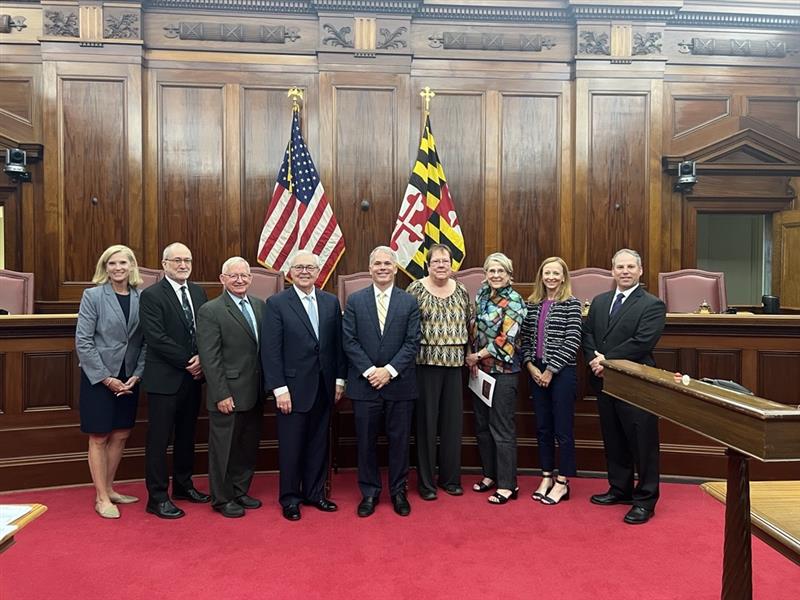
#SJIBoardofDirectors #SJIBoard #StateJusticeInstitute #BoardMeeting #SupremeCourtofMaryland #MarylandJudiciary


